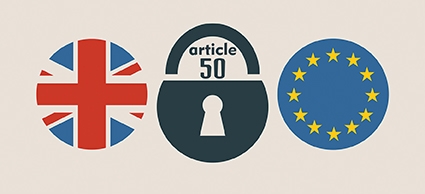Article 50 & EU Security
Theresa May's triggering of the formal procedure for Britain to leave the European Union has done little to make the fates of the UK and the EU any clearer; in fact, the waters have only become further muddied. Arguments over the sovereignty of Gibraltar, the potential independence of Scotland, future economic relations and even security issues have arisen, all in the shadow of France's upcoming presidential elections.
Spain has long set its sights on Gibraltar, with its tenuous claim to The Rock proving a major point of contention between London and Madrid. Debate became so heated in recent years that a Royal Navy frigate was deployed to the strait to reassure residents that Britain will not cede control to the Spanish; hardly the mark of the spirit of continent-wide cooperation and fraternity that Brussels claims the EU is made of. Comments made recently by Michael Howard comparing Gibraltar to The Falklands were derided as aggressive and provocative by some, but the parallels are too close for his remarks to be dismissed as mere small-minded, xenophobic jingoism. Should the European Union truly wish to embark on a productive future trade relationship with the United Kingdom, it would be well advised to leave Gibraltar out of negotiations.
Issues surrounding Gibraltar's sovereignty aside, however, it is remarkable that security has become a theme in the Article 50 negotiations. EU officials have expressed concern that an independent Britain will not contribute to European defence, especially in the ongoing shadowy information war against Vladimir Putin. Since security is the province of NATO and the UK has made no move to leave the alliance, this is surely a sign that emotions are running rather high in Brussels, and this fear over Britain's withdrawal from continental security might stem from the EU itself bringing outside issues into the negotiations. The United States maintains a sizeable military presence throughout its own bases in the European Union as the chief member of NATO, and so for security matters Britain should be treated as another overseas NATO power such as the US or Canada.
However, at this time it is in the interest of Brussels to play its most aggressive cards. Nicola Sturgeon is pushing the British Prime Minister for another Scottish independence referendum, forcing Theresa May to fight a war on two fronts, and perhaps some hawks in Brussels are hoping to keep Downing Street off balance and make life uncomfortable enough that London is forced to cede to some of the EU's demands. In addition, should Marine Le Pen prove victorious in France's presidential elections this month, she will likely begin steps to withdraw France from the Union, thereby granting Britain an ally in the form of another powerful exile and throwing the future of the EU into outright doubt.
In many ways, Britain's relations with Brussels and the survival of the European Union rest on the shoulders of the French public. While it would be tragic if the Union collapses so quickly after Georgia has finally made steps towards membership, Tbilisi should not make the same mistake as officials in Brussels and assume that the destruction of the EU would spell an end to continental security. The idea that Russia would benefit from a breakdown of the EU in a military and intelligence context is based in feeling rather than fact, since fears over NATO's future stem from the other side of the Atlantic. Rather than being a chip to bargain with at the negotiating table, security should in truth be the glue that binds Britain and the democratic continent together, regardless of the existence of an economic union-turned supranational state.
Tim Ogden












